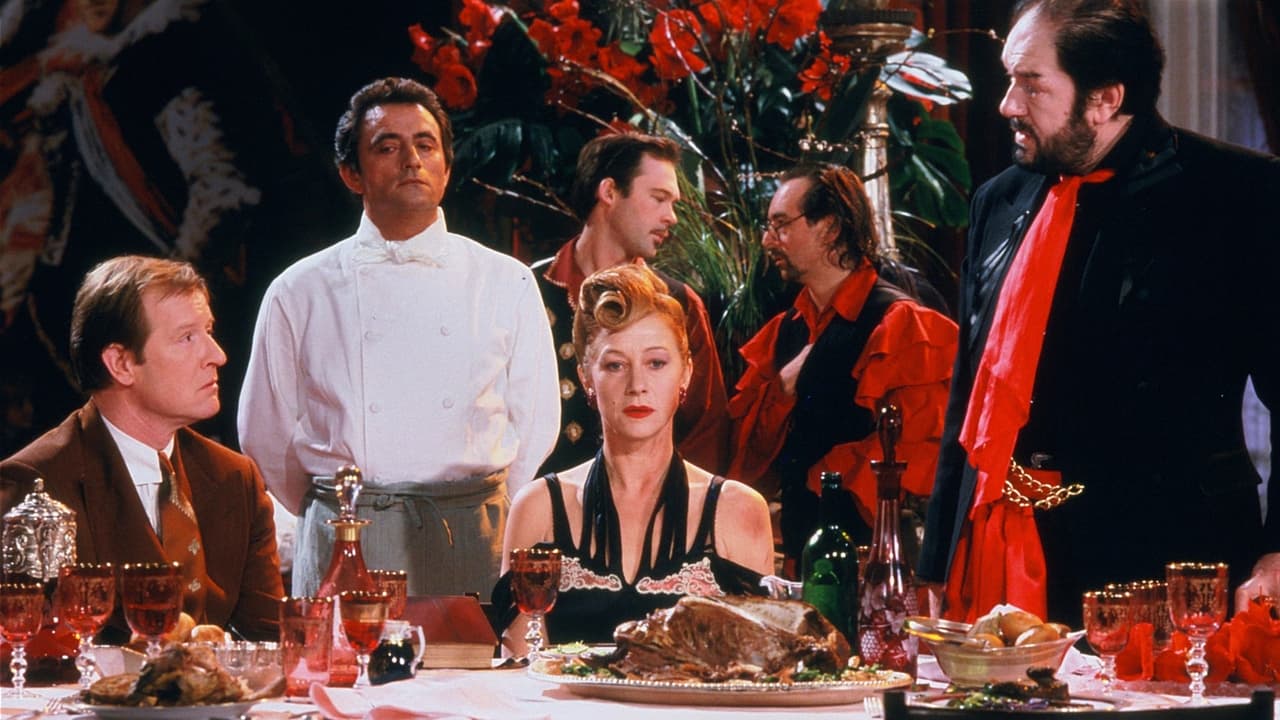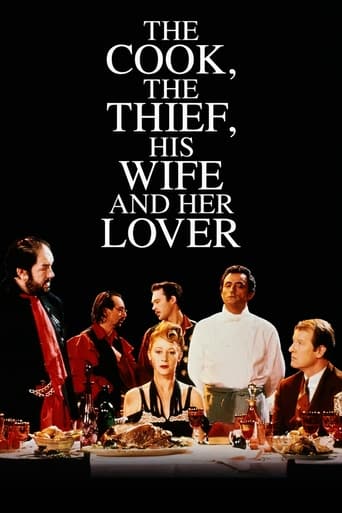



Wow! Such a good movie.
not as good as all the hype
Good concept, poorly executed.
It is not deep, but it is fun to watch. It does have a bit more of an edge to it than other similar films.
View MoreI got to this film years ago, quite by accident. I read an essay in "Postmodernism: A Reader" by Michael Nyman, when I was a student. This was at the same time that The Piano arrived on the big screen, so went to see that and investigated more.This, for me, is the best marriage of Greenaway and Nyman. The way the music shifts, in mood and temperament, with the scene and the backdrop and clothes is unique and memorable.Helen Mirren is a star here, but for me it's Spica, a great and lasting performance by Michael Gambon that stands out.Its enormous, cavernous looks, its story, its flamboyance, its cruelty. All of this with Nyman's beautiful score, harsh and delicate. Why a 10? Well, I reserve my 10 out of 10 for movies that answer the question "would I watch again, now, for the umpteenth time?".
View MoreHaving previously watched Greenaway's 'Prospero's Books', basically from the same era, one definitely gets a sense of the auteur, of great visualizing prowess in the Welsh native. I adore watching Helen Mirren from ANY era, but particularly here, in between the young adulthood beauty she displayed in Michael Powell's 'Age of Consent', through the remarkably absurd and audacious 'Caligula', straight to the sophisticated and very dangerous gorgeousness displayed in 'The Comfort of Strangers'.It's great to see any dude who's mean to a beautiful woman get their comeuppance (particularly the wealthy--it offers a sort of 'wish fulfillment' for the 99% of us), and the climax here is one of cinema's most articulate presentation of that phenomenon. It definitely made me wish to see the rest of both Greenaway's movies and of Mirren's performances. Well worth the acquired taste necessary for this sort of delicacy.
View MoreThis is easily Peter Greenaway's most famous film. This is despite, or most probably because, of its somewhat notorious reputation. Whatever the case, this has to be the most accessible film in Greenaway's highly inaccessible filmography. Although this is only a fairly relative statement because, despite having a fairly linear story, this is still very idiosyncratic and odd. It also displays the extremely cold tone that typifies this director's work in general. It could best be described as an art-house film with exploitation film subject matter. It contains all manner of unpleasantness, with physical brutality, humiliation, scatology and cannibalism; while it is sexually very frank with much full-frontal nudity and graphic conversations.So it's a very full-on film content-wise but what makes it very unusual is that it is quite uncommon for this type of material to be presented in quite the way it is here. Its visual style is thoroughly eloquent, with the cinematography of Sacha Vierney being particularly notable. Vierney is perhaps most famous for photographing Greenaway's favourite movie, namely Last Year at Marienbad (1961), a key experimental movie that clearly influenced him in many ways. Like that film, this one looks very lush too, with painterly compositions that are captured in widescreen by the carefully constructed tracking shots. The décor and costuming are both carefully considered, the latter are designed by Jean-Paul Gaultier; both give the film its own self-contained world that is very striking. The other key collaborator is composer Michael Nyman, whose soundtrack is again memorable but heavy going at times, with the high-pitched singing being a little hard to take. The actors do good work, although they are playing types as opposed to realistic characters; Michael Gambon certainly is in his element chewing up the scenery in his role as the obnoxious thief and Helen Mirren makes an impression in the tough role of his downtrodden wife.This is a film I like but with reservations. As always, Greenaway's style is very hard to fully embrace. The unpleasant aspects are slightly more sickening in some ways when presented in his deep-frozen style. While I believe that there is seemingly an allegory on Thatcherism in here apparently, I continually fail to detect it myself, so I simply take its events at face value. This isn't such a bad thing, as I do appreciate the self-contained world Greenaway has created and I do like his commitment to visual ideas. It's certainly a real oddity. It goes without saying but this film is categorically not one for everyone. It's easy to see why people hate it. But it will reward those that can take Greenaway's eccentricities.
View MoreI have a problem with art-house films like THE COOK, THE THIEF, HIS WIFE & HER LOVER and it's that the directors of such fare are often totally ignorant when it comes to decent film-making. Sure, they obsess over designer costumes and make-up, and they focus intently on the colour palette of their movies, but when it comes to movie-making staples like pace, character, dialogue, and intrigue, they fail.Peter Greenaway is such a director. This controversial 1989 opus is known for its gruesome scenes of cannibalism, yet take away the controversy and there's absolutely nothing here to rate this. The running time is as slow as a snail, and much of it is made up of scenes of the repulsive Michael Gambon character berating his wife and associates.Greenaway's a better director than he is a writer, because the script is terrible. We get the gist of Gambon's character and the situation with his wife in the first ten minutes, yet two hours of non-action go by in which we're bludgeoned over the head with his sheer monotonous brutish nature. The whole film takes place on a cheap-looking set that quickly becomes boring, Helen Mirren spends most of the running time naked and forgets how to act, and luminaries such as Tim Roth and Ciaran Hinds are wasted.Yes, there are a few shocking scenes, yet cannibalism is dealt with in a much more entertaining fashion in both B-movie fare (such as Pete Walker's 1974 FRIGHTMARE) and Hollywood flicks (like RAVENOUS). I'm not against arty films where nothing happens, but there has to be substance to go with the style; Nic Roeg's DON'T LOOK NOW is a case in point: one of my favourite films of all time, but hardly action-packed. THE COOK... just wastes a great deal of potential and proves to be another case of The Emperor's New Clothes.
View More